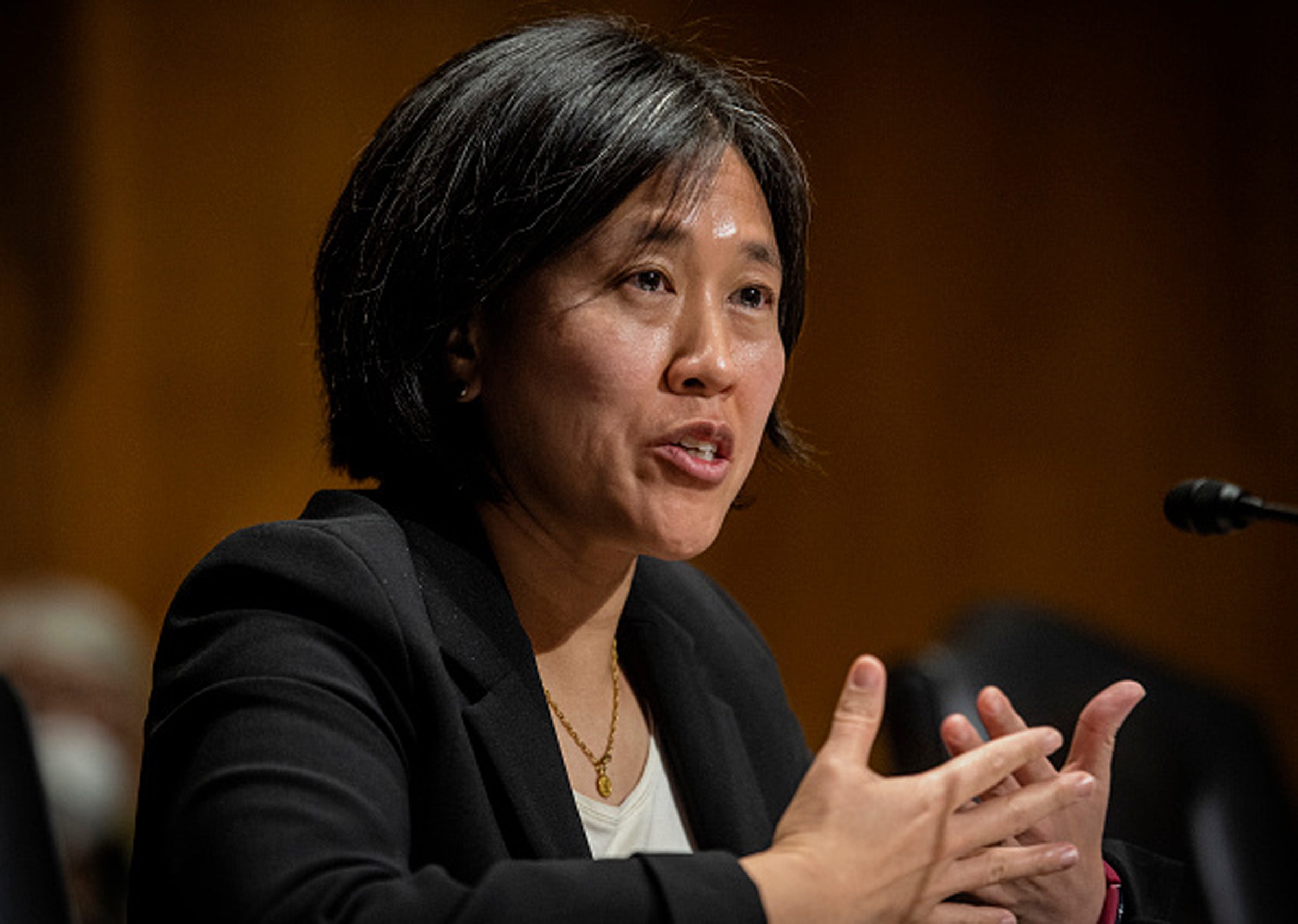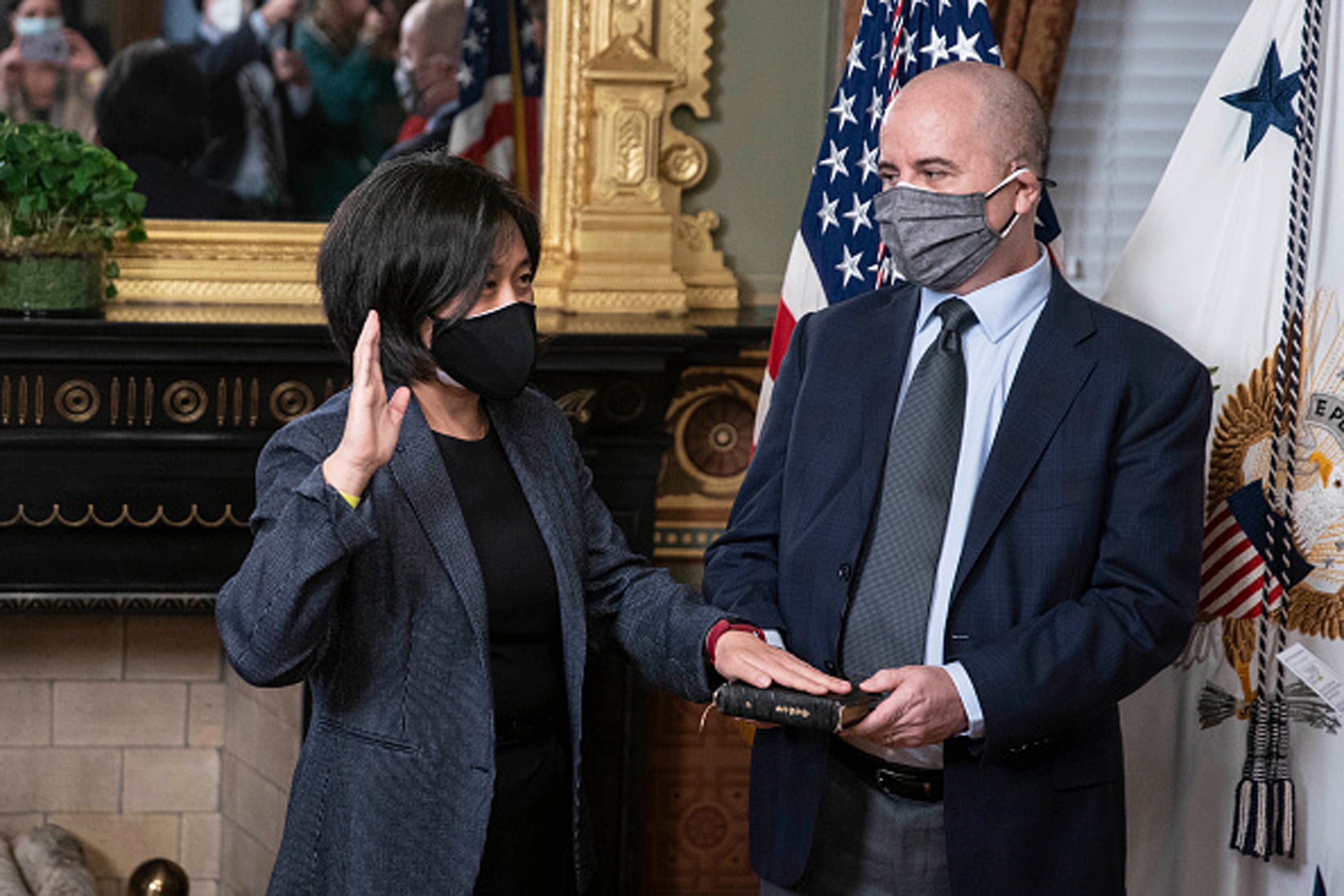On April 15, one month after the Senate confirmed her appointment 98-0 as U.S. trade representative, Katherine Tai ’01 spoke at a virtual conference, “Greening U.S. Trade Policy,” hosted by the Center for American Progress, a prominent D.C. public policy organization. Her address reinforced what was already widely understood: The Biden administration’s strategy for doing business with other nations would be fully integrated with its approach to a range of other issues, from the environment to national security to workers’ rights.

“For too long, the traditional trade community has resisted the view that trade policy is a legitimate tool in helping to solve the climate crisis,” said Tai, in her first public address as USTR. “As we have so often seen with labor issues, there is a certain refuge in arguing that this is all a question of domestic policy, and that we need not tackle the daunting task of building international consensus around new rules. But that dated line of thinking only perpetuates the chasm that exists between the lived experiences and expectations of real people on the one hand, and trade experts on the other.”
“Daunting” is a good word to describe the overall complexity confronting Tai in her new role.
“Daunting” is also a good word to describe the overall complexity confronting Tai in her new role as USTR. In a mind-boggling laundry list of concerns, trade between the United States and China looms large, as does U.S. engagement with the World Trade Organization. Both relationships might best be described as “frosty” under the Trump administration, with significant tariffs imposed on Chinese goods from 2018 onward (those tariffs remain in place, at least for now). As for the WTO, the United States blocked the appointment of new members to its seven-person appellate body, essentially neutralizing the organization’s ability to hear disputes brought by member countries. “No one’s really missed it,” said USTR Robert Lighthizer, Tai’s predecessor, in December 2020; at the time, the U.S. had also declined to support two-time Nigerian finance minister Ngozi Okonjo-Iweala as the WTO’s new director general, a stance reversed in early February.
There are a host of other headline-grabbing issues as well. One of the most immediately pressing — a 17-year dispute between the United States and the European Union regarding illegal subsidies to aircraft manufacturers Boeing and Airbus — has resulted in retaliatory tariffs from both sides on billions of dollars’ worth of goods, including everything from French wine to U.S. tractors. The conflict took one step toward resolution in March, with a four-month moratorium on those same tariffs opening the door for negotiation. There’s also the long-standing issue of protecting intellectual property — another wrinkle to confront when considering how to proceed with China — as well as violations to the re-negotiated version of NAFTA (known as the United States-Mexico-Canada Agreement) that Tai led through a contentious approval and reapproval process from 2018 to 2019 in her prior role as chief trade counsel of the House Ways and Means Committee.
The list of potential concerns is endless, really, with it all boiling down to a simple yet overwhelming question: What will the future architecture of the world trading system look like?
By all accounts, Katherine Tai appears to be in a rare position to address that question. Ask anyone enmeshed in trade’s legal and political minutiae about her qualifications, and prepare to be buried in superlatives. “It would be hard, if not impossible, to find anybody better equipped to do this job at this time in history,” says Harvard Law Professor William Alford ’77, director of the East Asian Legal Studies Program. Noting the unanimous support her nomination received (“Why Everyone Likes Katherine Tai,” read a Foreign Policy headline), Alford highlights Tai’s combination of political savvy, negotiating skills, and deep knowledge of the issues, a viewpoint echoed by Lori Wallach ’90, director of Public Citizen’s Global Trade Watch, who calls Tai “the unicorn USTR for this moment.”

“There are typically two kinds of USTRs,” she continues. “Political figures or trade wonks. Katherine is the unusual person who knows about the WTO and free trade agreements and anti-dumping law, and, and, and … she led the renegotiation of NAFTA under Trump, which had the biggest majority support in the history of trade agreements.”
Tai accomplished this, Wallach adds, with a listening, calm, respectful demeanor; yet “the fact that she was not screaming and pounding the table did not mean she was not incredibly strong and formidable.”
“With trade issues, it’s policy, politics, and ego. … You’re part wise legal counsel, part Obi-Wan Keno-bi.”
“Katherine is tenacious and creative; she will find the way to solve a problem. If the door is shut, she’ll crawl in the window if she has to,” says Claire Reade ’79, who worked with Tai at the Office of the USTR when Tai was associate general counsel (2007–2011) and chief counsel for China trade enforcement (2011–2014). “Her ability to get along with people and keep them at the table is very important — with trade issues, it’s policy, politics, and ego. You have to be deft in your handling of so many diverse needs. You’re part wise legal counsel, part Obi-Wan Keno-bi.”
Tai will also have HLS Professor Mark Wu at her side as a senior adviser to the USTR. Wu’s extensive research and publications in the area of international trade encompass areas including digital technologies, the impact of emerging economies on global governance, and the environment. Currently on leave from HLS, Wu is in his second stint at the Office of the USTR, too: Earlier in his career, he served as director for intellectual property, leading negotiations for the IP chapter of several free trade negotiations. “For someone like Mark, who has spent his career immersed in these issues — issues that are now really front burner — it could not be a better time to be at USTR,” Alford says.
Tai’s parents were born in mainland China and moved to Taiwan before immigrating to the United States. Katherine Tai was born in Connecticut and grew up in the D.C. metro area, where her father worked as a researcher at Walter Reed; her mother still works at the National Institutes of Health, researching opioid addiction. After graduating from Yale University in 1996 with a history degree, Tai, who is fluent in Mandarin, lived in Guangzhou, China, for two years, teaching English at Zhongshan University as a Yale-China Fellow.
When she was introduced as President Biden’s nominee on Dec. 11, 2020, Tai recalled a moment from her previous stint at USTR. She and colleague Shubha Sastry were appearing before the WTO’s appellate body in Geneva to present a case against China, which had put illegal ex-port limitations on the rare earth minerals used in lithium batteries. “We sat down at the table — she, whose parents had emigrated from South India, and I, whose parents had come from Taiwan — and my heart swelled with pride as we raised our placards and stated that we were there to present the case on behalf of the United States of America,” she said, her voice clear and strong. “Two daughters of immigrants, there to serve, to fight for, and to reflect the nation that had opened doors of hope and opportunity to our families.”
That lawsuit against China was largely successful. Yet it, and others that will no doubt be brought to the WTO, can’t get at the larger structural issues that put a free-market economy at odds with one in which state-owned enterprises are the norm, notes Alford. That fact has driven much of the skepticism facing the WTO’s ability to enforce established trade agreements, particularly where China is concerned — a sentiment predating the Trump administration and signaled by Tai as well, who cited the need to work together on reforms to the organization’s appellate body when questioned during her confirmation hearing.
Meanwhile, the clock is ticking as other nations form trade alliances and move forward without the United States. Beijing’s 15-nation Regional Comprehensive Economic Partnership in Asia, negotiated just last year, includes significant partners such as Japan and South Korea, for example. Whatever shape U.S. trade policy takes, it will follow in the footsteps of previous administrations that also walked the delicate line between reaping the economic advantages of open trade and ensuring American workers don’t suffer its consequences. “There’s no silver bullet,” Al-ford says of that balancing act. “These are difficult trade-offs, and when you get to the politics — you can just imagine.”
Yet the rewards of that work are lasting. Reade, now senior counsel at Arnold & Porter, recalls the Office of the USTR as “an amazing, over-whelming place to work when you consider the decisions being made, the level of responsibility, and the fact that your work is never done. But you do feel as if you’re participating in a process of moving forward on meaningful issues,” she adds, “and that life will be made better when you do. Who can not want that?”
Whatever shape U.S. trade policy takes in the months and years to come, it’s clear that Katherine Tai is driven by a similar sentiment, holding the “lived experiences and expectations of real people” referenced in that first public address on climate at the forefront of her thinking as she navigates the domestic and international complexities of her work. “Trade is like any other tool in our domestic or foreign policy,” she stated, when President Biden introduced her as his nominee last December. “It is not an end in itself. It is a means to create more hope and opportunity for people, and it only succeeds when the humanity and dignity of every American and of all people lie at the heart of our approach.”
